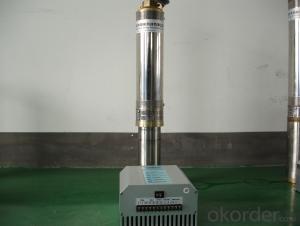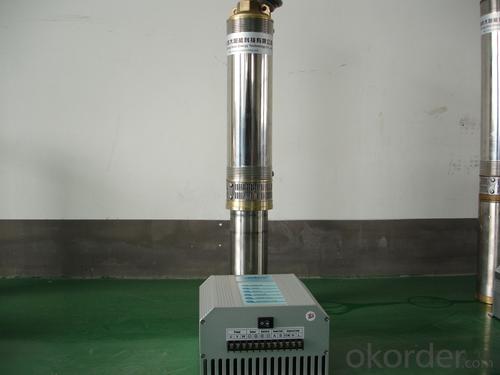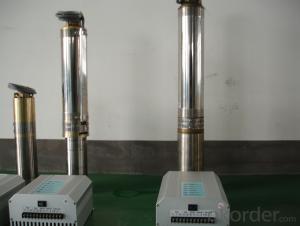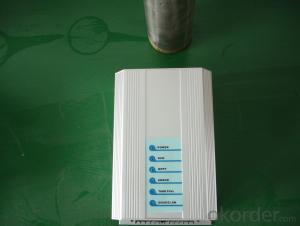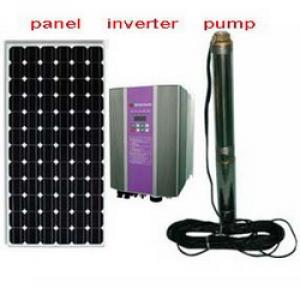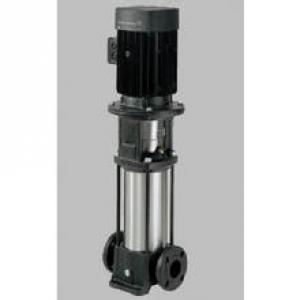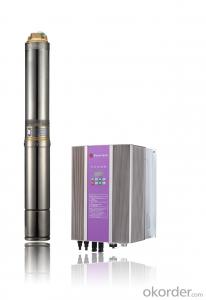Sunnydaze Solar DC Solar Pump
- Loading Port:
- China Main Port
- Payment Terms:
- TT OR LC
- Min Order Qty:
- -
- Supply Capability:
- -
OKorder Service Pledge
OKorder Financial Service
You Might Also Like
Item Description :
This superb new addition to our solar fountain range comes with a 10w solar panel,and a powerful fountain pump that is capable of producing fountains of up to 2m in height. As well as being easy to set up and use.Instruction manual is supplied for assembly and maintenance.
Solar Fountain Key Features :
Powered by direct sunlight
No high voltage electric mains required
Safe for children
Max. height of fountain: 2M
Max. flow capacity: 800 L/H(176 GAL)
10W Polycrystalline solar panel included
18V DC brushless pump
Solar Pump Features :
Can produce fountains up to : 2M (tube height) 1.4M (fountain height)
Comes with multiple nozzle accessories
Cable Length : 5M
Solar Panel Features :
10W peak power.
Polycrystalline highly efficient solar panel
Comes mounted in aluminium frame
Comes with ground stake and rotating knob so you can angle your panel toward the sun
What You Will Get :
10W solar panel
Solar pump
Ground Sake
Nozzle accessories
Precautions :
DO NOT alter or change the product itself or its components
Operate pump in freshwater only, never above 50 degrees celsius
Keep away from flammable liquids
Do not connect to any other power supply other than the included
- Q: Can a solar pump be used for fire protection or firefighting purposes?
- Yes, a solar pump can be used for fire protection or firefighting purposes. Solar pumps can provide a reliable and sustainable source of water, which is crucial for firefighting activities. They can be used to draw water from various sources such as wells, ponds, or rivers, and can operate even in remote areas without access to electricity. Solar pumps are efficient and environmentally friendly, making them a suitable choice for fire protection and firefighting applications.
- Q: Can a solar pump be used to pump water for livestock?
- Yes, a solar pump can be used to pump water for livestock. Solar pumps use energy from the sun to power the pumping system, making them a sustainable and cost-effective option for providing water to livestock. They can be used in remote areas where electricity may not be readily available, making them an ideal solution for watering livestock.
- Q: Can solar pumps be used for water supply in remote healthcare clinics or facilities?
- Yes, solar pumps can be used for water supply in remote healthcare clinics or facilities. Solar pumps are an efficient and sustainable solution that can provide reliable access to clean water in areas without access to electricity. By harnessing solar energy, these pumps can operate independently, reducing the need for costly and unreliable diesel generators. This makes them a viable option for remote healthcare facilities, ensuring a continuous water supply for critical healthcare services.
- Q: Can solar pumps be used for water supply in educational institutions or universities?
- Yes, solar pumps can be used for water supply in educational institutions or universities. Solar pumps are a sustainable and environmentally friendly solution that can effectively pump water from wells, rivers, or other sources to meet the water supply needs of these institutions. They can provide a reliable and continuous water supply, especially in regions with abundant sunlight. Additionally, using solar pumps can reduce dependence on traditional electricity sources and help educational institutions contribute to a greener and more sustainable future.
- Q: Can a solar pump be used in areas prone to earthquakes?
- Yes, solar pumps can be used in areas prone to earthquakes. Solar pumps are typically designed to be durable and resistant to various environmental conditions, including vibrations and shocks caused by earthquakes. However, it is important to ensure proper installation and regular maintenance to ensure their continued functionality and safety in earthquake-prone areas.
- Q: Can a solar pump be used for water desalination?
- Indeed, water desalination can make use of a solar pump. By harnessing solar energy, these pumps are capable of converting sunlight into electrical energy, enabling them to function. Water desalination is the procedure wherein salt and other impurities are eliminated from seawater or brackish water, making it suitable for drinking or irrigation. Solar pumps can efficiently draw water from its source, such as the ocean, and direct it towards a desalination system. Solar pumps bring numerous benefits to water desalination. Firstly, they are environmentally friendly since they don't generate greenhouse gas emissions or rely on fossil fuels. As a result, they serve as a sustainable solution, particularly in regions with ample sunlight. Additionally, solar pumps prove to be cost-effective in the long run as they don't require fuel or electricity expenses once installed. Nevertheless, it is crucial to acknowledge that a solar pump alone cannot desalinate water. Its main function is solely to pump water into a desalination system. The desalination process usually involves either reverse osmosis or distillation, both of which demand energy to operate. Solar pumps can be seamlessly integrated into these desalination systems, allowing the solar energy generated by the pump to power the entire desalination process, thus establishing a self-sufficient and sustainable system. All in all, a solar pump can unquestionably be employed for water desalination, but it must be integrated with a desalination system that utilizes solar energy for the actual purification process. By combining these elements, a reliable and sustainable solution for producing clean and drinkable water from seawater or brackish water sources can be achieved.
- Q: How does a solar pump handle fluctuations in water quality?
- A solar pump is designed to handle fluctuations in water quality efficiently. The pump uses an integrated filtration system that can remove impurities and sediment from the water, ensuring a consistent flow rate even when the water quality changes. Additionally, some solar pumps are equipped with sensors and automatic controls that can detect variations in water quality and adjust the pump's performance accordingly. This helps maintain the pump's efficiency and prolong its lifespan, even in challenging water conditions.
- Q: Can a solar pump be used for water transfer between reservoirs or tanks?
- Yes, a solar pump can be used for water transfer between reservoirs or tanks. Solar pumps are designed to harness solar energy and convert it into mechanical energy to move water. They are commonly used for various water transfer applications, including transferring water between reservoirs or tanks. The solar pump's efficiency, capacity, and design need to be considered to ensure it meets the specific requirements of the water transfer project.
- Q: Can a solar pump be used for water circulation in fountains or decorative features?
- Yes, a solar pump can definitely be used for water circulation in fountains or decorative features. Solar pumps are efficient and eco-friendly alternatives to traditional electric pumps, as they harness energy from the sun to power the pump. They are commonly used for circulating water in outdoor fountains, ponds, and other decorative water features, providing a sustainable and cost-effective solution.
- Q: How do solar pumps handle water with high fluoride or chemical content?
- Solar pumps can handle water with high fluoride or chemical content in a similar way as traditional pumps. The primary function of solar pumps is to circulate and transfer water, regardless of its chemical composition. However, it's important to note that the quality of the water being pumped may have an impact on the longevity and efficiency of the pump. In cases where high fluoride or chemical content is a concern, pre-treatment methods such as filtration or chemical treatment may be necessary to ensure the pump's optimal performance and longevity.
Send your message to us
Sunnydaze Solar DC Solar Pump
- Loading Port:
- China Main Port
- Payment Terms:
- TT OR LC
- Min Order Qty:
- -
- Supply Capability:
- -
OKorder Service Pledge
OKorder Financial Service
Similar products
Hot products
Hot Searches
Related keywords
